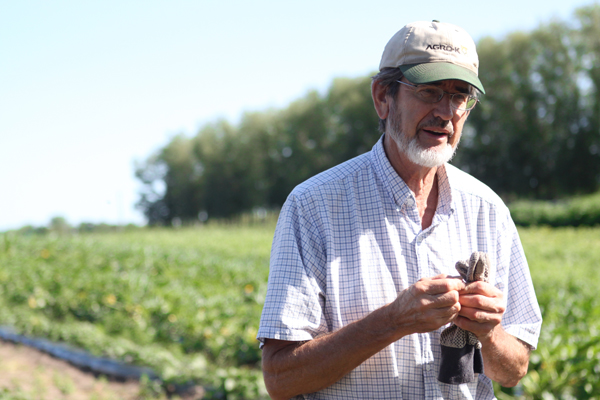
This piece began as a classic farm-to-market story: It was mid-August, the Cities were gearing up for the State Fair, and Minnesota Cooks pitched us the opportunity to speak with one of the producers supplying their upcoming event. We chose Natura Farms for two reasons, one because they had partnered with Spoonriver – a restaurant whose veggies have long inspired our appetites – and two because we were fascinated by something we found on the farm’s website: “Eco-farmers are the genuine health workers of the world because ‘health comes from the farm, not the pharmacy!’”
The story progressed; we interviewed the affable farm manager, Paul Otten, visited Natura and photographed fruits and vegetables. And then, in the course of our research, we discovered that Christ’s Household of Faith (CHOF), a church and community in Saint Paul, owns the farm. In its more than 30-year existence, CHOF has had its share of controversy and has not always fared well in the media. The issue became this: Can we write about Natura and Paul Otten without addressing past allegations, some of which are fairly serious?
In the end, we determined that today, at least, the farm and CHOF intersect at food and health. This is, in short, a story about a farmer, his idiosyncratic growing style, and his philosophical approach to diet.
On an early Saturday morning in late August, the air at Natura Farms is warm and quietly buzzing with bees. The light has that golden quality that comes with fall and in it the white farmhouse and adjacent barn, lined with yellow dwarf sunflowers, look positively iconic.
Natura, located in Marine on St. Croix, is actually a single farm and, at just 25 acres of agricultural area, a deceptively small one. Looking out across the land, it seems possible to sum it up in a sweeping glance: fields, green houses, orchard, and vineyard. Yet that space belies an unusual diversity of fruits and vegetables, from the everyday to the somewhat treasured — as in a collection of some thirty gooseberry and currant varieties.
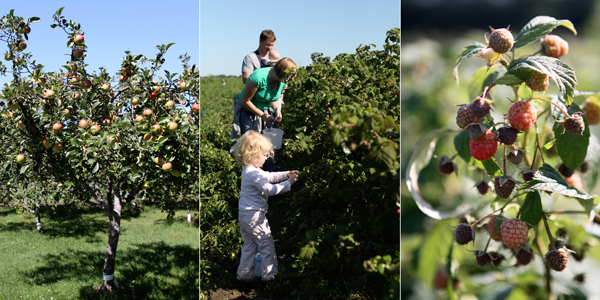
It’s a u-pick farm, but even though the day is gorgeous, there are only a handful of takers – could be the time of day, the time of season, or the fact that outside of its website, the farm doesn’t advertise. Natura is less a commercial venture than it is a source of organic produce and fruit for CHOF in St. Paul.
It is hard to get a bead on CHOF: It has been called a church, a commune, and a cult. Since about 1970, its members have followed the religious leadership of Donald Alsbury, a one-time pastor with the Lutheran Church – Missouri Synod, but the church is non-denominational Christian and there isn’t a formal hierarchy.
Originally, members gave all their worldly possessions to CHOF when they joined and were fully supported by the church. Today, some members moonlight for spending money, but the spirit of communal living prospers. The church still provides jobs, a small stipend, basic health care, a K-12 education, access to vehicles, and a place to live. CHOF owns several homes around Ramsey Hill and some of its members live in the church’s headquarters at old St. Joseph’s Academy, which also houses the school. Jobs are provided within the organization, at CHOF-owned businesses – among them, North Star Kitchens, an award-winning kitchen and bathroom cabinetry company – or at the school, which also has an excellent reputation.
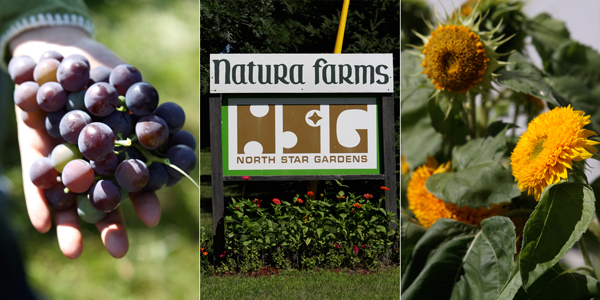
Quiet and inwardly focused, CHOF makes the news rarely, typically when the school’s basketball teams win — or when there’s controversy. Over the years, the church has had its share of public debate, including a more than 18-year court battle, which culminated in 2008 when the Minnesota State Court of Appeals ordered CHOF to pay the $235,000 in over-due child support owed by one of its members and the church failed to bounce it into the federal courts. In the early ’90s, former members alleged physical abuse against women and children; reportedly, formal charges were never made, but Alsbury’s public and unqualified support of corporal punishment still haunts the church.
While the road has not been entirely smooth, it is still remarkable that CHOF has managed to successfully sustain itself – now some 500 members — for more than 30 years.
And, in that, Natura Farms plays a role.
CHOF owns the farm, but since they bought it nearly 25 years ago, no one has taken a more active interest or hand in its soil and crops than farm manager Paul Otten. “I was the one who found the farm,” he says, “and I was instrumental pushing the farm and buying it, establishing it, and developing it; that’s where my heart is, so regardless of what I did, I always spent some time on the farm.”

He comes by that passion honestly. Otten was born on a remote German-Russian colony near Santa Rosa in Southern Brazil, where his father was a Lutheran pastor and a farmer. “The nearest store was three hours away by horse and buggy,” he says. “We got there maybe twice a year and bought things like sugar, salt, pepper, and spices that weren’t what we considered food.”
“My dad’s predecessor, pastor Albert Lehenbauer, had actually introduced soy beans to Brazil, so our farm was sort of a historical place, but it was so far out in the boonies – and it’s a good thing looking back – we basically had to produce our own food or trade with neighbors.”
In 1957, Otten’s family came to the US on sabbatical and, following in his father’s steps, he entered Concordia Theological Seminary in Springfield, IL. Once ordained in the Lutheran Church – Missouri Synod, he was called to Minnesota to serve as pastor, at the tender age of 25, for congregations in Hill City, Remer, and Federal Dam. He had wanted to return to Brazil: “Going to Northern Minnesota was the next thing to being exiled,” he says. “In fact, I had gotten called to the mouth of the Amazon, but church politics scuttled that – which was the instrument that caused me to question the whole thing. How can God send me to Brazil in 1962 and then several months later say, oops I made a mistake?”
Disenchanted with the Missouri Synod, Otten began to ponder his relationship with God. Closely studying the original works of Carl Ferdinand Wilhelm Walther, a founder of the Missouri Synod, and Martin Luther, he found that they resonated more deeply with him than current church practices. In particular, he was struck by the idea that one should not possess insurance against the acts of God; instead, one should look to one’s brothers and sisters, one’s neighbors, for help in times of need. “If nobody had any need, there would be no place for love,” he says, “because love functions in care for the other. If the brother has a need, and I have the wherewithal, my property, my expertise, my car, ultimately, everything I call my own, belongs to God the Creator and it is to be administered for the good of all his children.”
Around that time, Otten met Donald Alsbury, who had graduated from Concordia a year earlier and was a pastor in McGrath, MN. The two shared a similar philosophy, and by 1967, Otten had left the Missouri Synod and he, Alsbury, and a handful of other families were building the foundations of what would eventually become Christ’s Household of Faith.
Over the last few decades, Otten has played a myriad of roles within CHOF: desktop publisher, master carpenter, director of health, and farm manager. But he’s always had one foot on the farm.

CHOF has always had a substantial garden, renting or bartering an acre here and an acre there. It wasn’t until 1983 that they bought Natura. “We bought it because, number one, we wanted to produce our own food and we have about 100 families,” Otten says, “and we also wanted our kids to have a rural experience. Many of the families were fairly large; how do you keep kids out of trouble and teach them to work?”
“Today we farm primarily for health — and our own satisfaction — and there are kids out there who enjoy doing the work,” he adds. “But if it weren’t for health, from a business perspective, we would probably just buy our produce.”
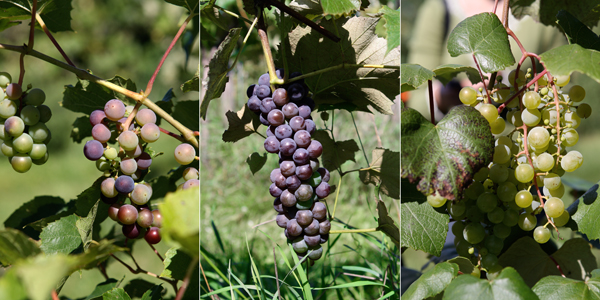
The farm had been part of an old, 140-acre dairy, and CHOF was able to buy it, in part, because it was worn down. “The prairies of Iowa, Nebraska, and Minnesota at one time had six feet of topsoil,” Otten says. “When we bought the farm, it had five or six inches of topsoil and the organic content was around one percent. So, you look down the road and think, what can you do with it?”
The church took a chance, and for the last 25 years has worked hard to amend the soil with minerals and organic material and put organic farming practices in place. It has paid off. Today, Otten says, testing shows the farm’s fields have 16 inches of topsoil and three percent organic matter. “That’s what our plants have access to,” Otten says, “It’s like, instead of having this little bit of food, now they have a big bowl of food and a much wider variety.”
This is the basis of Otten’s philosophy — Healthy soil, healthy plants, healthy people. He believes that a change in diet could solve America’s current health care crises. “Health care reform today really comes down to who gets the money,” he says. “The reform has to happen with us, with people’s food and lifestyle. If we ate real food and not junk, I bet in a year or two we could cut health care costs in half.”
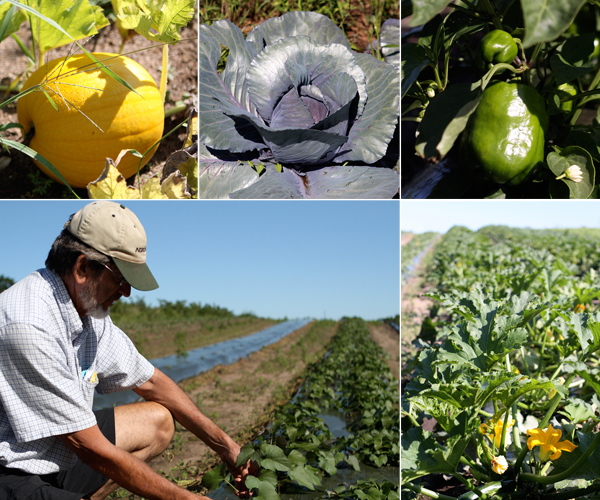
He supports this theory with statistics: In 1950, Americans spent 4.5 percent of their income on health care and 19 percent on food. Today, according to Otten, we spend 18 percent of our income on health care and only 8 percent of food. “And if you look at that, since the very definition of food has changed, probably only 3 percent of that is real food and the rest is the industrial look-a-like imitation.”
“Fifty or 60 years ago,” he adds, “diabetes was rare; this has to do with obesity, with consuming too much refined carbs and then forcing the body to compensate. Food is not junk and junk is not food, so why do we put the two together and make ourselves think we are nourishing our bodies?”
The antidote, of course, is to eat a wide variety of organic fruits and vegetables — Natura’s specialty.
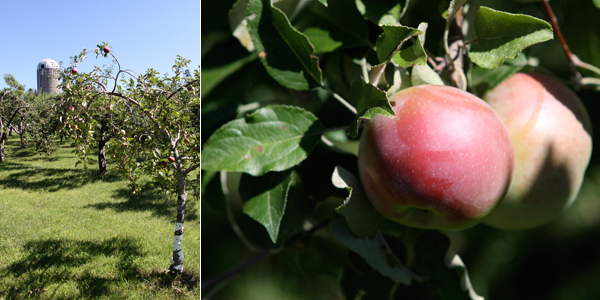
In particular, berries are a joy of Otten’s and he has made the farm somewhat famous for its collection, which includes strawberries, blueberries, and several different varieties of raspberries, currants, and gooseberries. “I just love the taste,” he says, “As a teenager in Brazil, I gathered brambles from the wild and planted them in our yard. It’s simply enjoyable. In the middle of winter, to brush up against the black currant cane — ah, to me, it smells good.”
As an adult, Otten has gathered gooseberries and currants from all over world. Several years ago, he had more than 120 varieties; all planted in tiny crops of five plants each. “I got heavily involved. At one time, I was president of the North American Bramble Growers Association,” he says. “And my publication, the Northland Berry News, had subscribers in 16 different countries.”
Otten’s seemingly endless energy for growing attracts other enthusiasts to the farm: a food scientist, unnamed but famous for organic soy burgers, brought him Ukrainian squash. An octogenarian horticulturist visits each week to tend the vineyard, which features a small amount of a few grape varieties, including Elmer Swenson’s Edelweiss. Indeed, walking the farm, Otten seems to know the provenance of each plant and tree, and every one has a story, a rarity, or a connection to a famous scientist. “Most of it’s happenstance, I meet a person, we trade things – I very seldom have to go looking for it.”
This aspect of the farm seems a bit quirky, and talking to Otten, one has the sense that he simultaneously wishes the farm were even more diverse and that it carried fewer larger crops.
“It sometimes it drives me half nuts, the variety,” Otten says. “But I wouldn’t change it, primarily because we do farm for health and there are people who will eat kohlrabi but not beets, lemon cucumbers but not regular cucumbers — it goes on and on. The challenge becomes, how can we help this person eat good food?”
Access is a great start. Natura’s produce is delivered to church members via a mini farmers market, which Otten and volunteers set up in a gazebo alongside St. Joseph’s on Tuesday and Friday afternoons. In September, when the season is in full swing, the gazebo’s bins are so overflowing with produce – peppers, eggplants, leeks, potatoes, tomatoes, squash, beets, apples, grapes, melons, onions, chard, kale, lettuce, and sweet basil – that it’s possible to smell the market from the opposite side of the building. Otten sends out an email each week, detailing the harvest and letting folks know if there are shortages, but essentially members are able to stop by at their leisure and take what they need for their family.
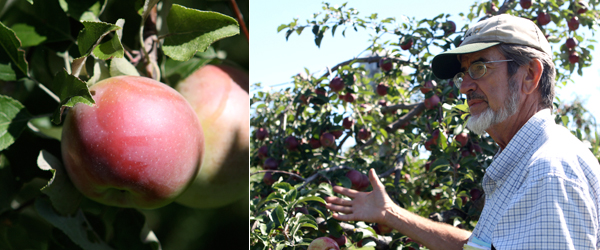
In the fall, the church’s 6th graders — a tiny class of two girls and 10 boys – help manage market days, which means they get to spend Tuesday and Friday out at Natura picking vegetables. “It’s a lot of fun for the kids; they love to harvest,” says Donald Bluhm, CHOF elementary school teacher and principal. “One of the things I have the girls do is pick and bundle basil and kale – they are pretty good banders. The boys cut cabbage for us. Some days, I’ve counted at least 20 varieties of fruits and vegetables that we’ve brought in to the market.”
Bluhm says the kids learn how to harvest, track the bushels of produce they bring in, and set up a tidy market. “They get 16 full days on the farm,” he says. “They learn to live and work together, and they learn that what they are doing is important to the family – that what they are doing is worth something. They feel that.”
This year, the class has also been involved in a science experiment, of sorts, chasing after an epidemic of pocket gophers that is chewing its way through the farm’s crops, irrigation systems, and even greenhouse wiring. “They’re cute, but they are just devastating,” says Bluhm. “So the kids have been really interested in getting the gophers under control. The farm is organic, so we’ve had to figure out how to capture them using traps; we caught 49 gophers in a 4-acre blueberry plot!”
Working at the farm encourages a strong appreciation for the vegetables, Bluhm says. “Usually, by the end of the day, the kids are trying to get my cell phone so they can call home and see if they need any vegetables. Usually, if a kid brings home something for the family, they’ll try to cook it, so it’s kind of a nice way to get the families to eat more vegetables, too.”
In the early days of CHOF, the farm sold much of what it produced to support the school. Starting in 5th grade, kids spent their entire summers working — and playing — on the farm, providing a strong workforce. Over the years, the farm’s focus has shifted to feeding the community and sustaining itself, and only a few kids spend their summers out there. And in general, volunteer numbers have dwindled; Otten works between 60 and 90 hours a week.
“It’s kind of hard to manage,” says Otten. “I always say my crew is etched in Jell-O. Some days I have no one, some days there’s 15 to 20 students and teachers out here. It’s fun, but it makes management and weed control difficult.”
This ebb and flow of interest in the farm doesn’t seem to worry Otten. Looking ahead, he would like to see Natura become a holistic health center, “Where people can learn, formally or informally, about food as medicine,” he says, “how to grow food from the soil up so their food can have the nutritional density it needs to support health.”
He could also see bringing in holistic health practitioners, from nutritionists to naturopaths and yoga instructors.
Is there interest at CHOF for such a thing? “There’s talk among some of us and sometimes that’s how the seed gets going and starts germinating,” Otten says. “We also have professionals who are very interested in helping us because they think this is the avant garde, this is where things have to be if we are going to retain health in America at all.”


Fascinating story. Good journalism, as well.
Jon, thought you’d be interested in the place and wellness philosophy of the people and place that grows the raw materials that keep you cooking, literally! – Paul
Great article! Fascinating!